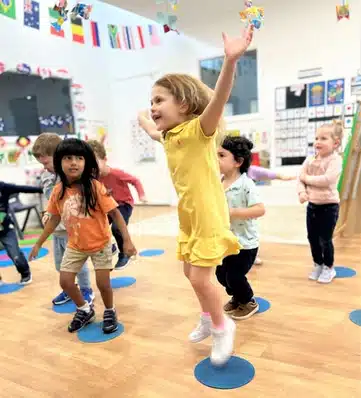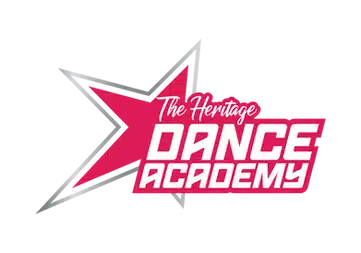 Book a Tour
Book a Tour WhatsApp
WhatsApp Join Waitlist
Join Waitlist
From the moment they’re old enough to stand (or even crawl) children seem to have an inherent love of music and dancing. Long before they’re able to talk, babies start to naturally respond to music, bopping and grooving along to their favourite tunes. As they grow, so does their love of movement, and older children are usually keen to get their whole body involved, incorporating leg, arm and full body movements when the mood strikes. But dancing is not only great fun for children, it also has an impressive number of developmental benefits, which is why Heritage House has launched The Heritage Dance Academy, giving our children the chance to engage in dance classes for no additional cost.
So, what are the benefits of dance in early childhood development and why did we decide to add it to our offerings?

Probably the most obvious benefit of dance in early childhood development is the way in which it encourages children to engage in a wide variety of physical movements, while also getting their heart rate up. According to the Australian Department of Health, toddlers should engage in 3 hours of physical activity every day, while children aged 3 to 5 should also be having an additional hour of vigorous exercise that elevates their heart rate. Dance is a great way to ensure children are getting active every day, while also developing some important physical skills such as balance, flexibility, coordination and endurance. Even if your child is getting plenty of exercise running around outside, it’s important to remember that children engage in different kinds of physical movements when they dance, such as sliding, jumping, twisting, bobbing and bending, all of which develop different muscle groups and physical skills.
Dance can be a great way to express, process and embody emotions. Dance can help children to learn how their body and their emotions interact and can also be used as a tool to work through difficult emotions like anger and frustration or as a fun way to channel emotions like excitement and joy. Children can use dance to help shake off big feelings that are overwhelming their bodies and to instantly boost their mood. Regular dance has also been shown to reduce stress, helping your little one to balance their mood and stay calm and regulated over the course of the day.
While dance may seem like a predominantly physical activity, it actually has a huge cognitive aspect and research has shown that children who are regularly exposed to music and dance receive a boost in their language, reading and speech development. Learning dance sequences also promotes problem-solving, communication, memory skills and even abstract thinking, which can boost your child’s development in a number of areas completely unrelated to dance.
Dance incorporates a number of specific skills that are important to develop during childhood such as:
As most adults will know, dancing is a very social activity and can be a great way to engage with others and form bonds. Children must work together to listen to the teacher and then execute the dance together, encouraging teamwork and fostering a sense of community and collaboration. Plus, all the feel-good hormones surging through their bodies as they dance can bring children together and forge friendships that last much longer than the duration of the dance class.

Here at Heritage House, we believe children should have access to all the fun, enjoyment and developmental benefits of dance, which is why we’ve launched The Heritage Dance Academy. This will be available at each of our operating centres, at no extra cost and will teach children the fundamentals of four styles of dance: ballet, jazz, hip hop and rhythmic. As well as incorporating all the benefits of dance, The Heritage Dance Academy will also introduce basic numeracy and literacy concepts such as counting out beats, spelling out words and helping children decode information through understanding symbolic and non-verbal cues. If you are interested in learning more about our extra-curricular activities and how these help us establish well-rounded and happy children, please contact us online or call 1800 453 638.